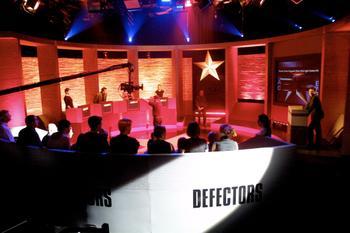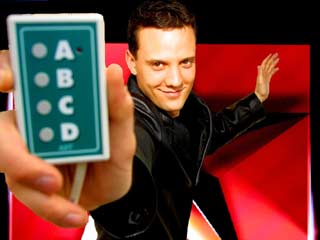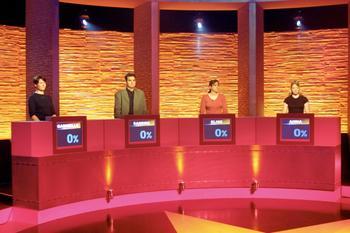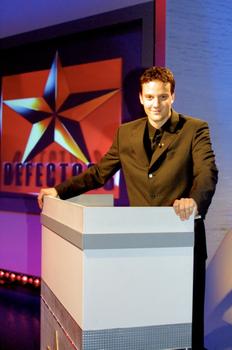Defectors
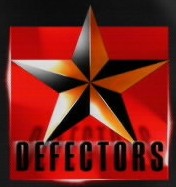
Synopsis
Imagine that you're an elephant. But you're an elephant that makes a trumpeting noise that's 100 times smaller than the biggest elephant in the land. You'd be forgiven for feeling just a little bit inferior.
Replace "elephant" with "television station" and suddenly that first paragraph gives you some idea of the battle between ITV (peak ratings: about 10 million) and Challenge TV (peak ratings: about 100,000). It is with some relief, therefore, that CTV's latest offering has a lot to commend it. So let's give the little guy a break for once and try - yes, try - to write a positive review.
Defectors is in principle quite a cute idea for a game show. The audience (the aforementioned defectors) have to back which contestant they think will get a question right. The percentage vote for each player represents the number of points on offer to them for the next one or two questions. Both the winning contestant and the defector who most consistently backs a correct contestant wins 1000 royal portraits (well, if we still had a £1 note, that is). So the contestants can't win without the backing of the audience, and an audience member won't win unless they back the right contestant. Quite a nice dynamic.
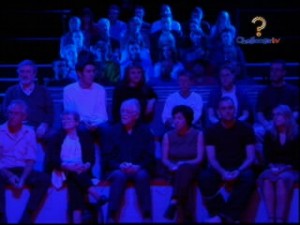 The Defectors
The DefectorsIn the opening round First Impressions, the audience are invited to back which contestant they want for the first two questions of the programme after only seeing them and hear them say their name and where they come from. We hear a five-second jingle (more of which in a moment) while the camera zooms around the audience as people press A, B, C or D on their Defectors voting panels.
Since this is the first of many voting sessions during the show, they have done their best and tried to shoot the voting using a large number of different angles throughout the 40 minutes and they just about get away with it. What would have been nicer is a computer graphic which showed you all the people (represented as dots or something) defecting from one contestant to another. As it is, the scores for each contestant are just shown in boring percentage terms.
The questions in the first two rounds are Millionaire-style multiple choice. And it's here that the main eye-popping moment actually occurs. The computer graphic display for the questions is nothing short of a work of beauty, with a lovely 3D dissolve as questions gradually fade in and melt away. Additionally, the central red star (subliminal sponsorship for a courier company, we think) rotates as the correct answer gradually highlights. It's fab.
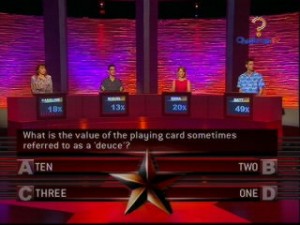 Dig that display module, daddio
Dig that display module, daddioOnce two questions are asked, the audience are asked again to vote for their preferred candidate. We then move on to Trust Me, which is very similar to the previous round except that before each brace of questions the subject is announced and each contestant is given about 10 seconds to justify why they're the bees knees at it. This is neat because it tells you something about each contestant as we play the game, assuming they're not lying to curry favour, that is. Comically, the contestants get their mikes faded out if they don't finish their speech in time. What seems more than a little harsh is that the player on the left always has to speak first.
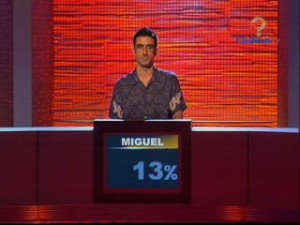 Altogether now: "San San San San Miguel!"
Altogether now: "San San San San Miguel!"Finally, we move on to Quick Defect, which is a buzzer round. Before each question, the subject of the next question is announced and the defectors do their thang and defect like the good defectors they are. The question is then read out and it's first on the buzzer who gets to answer. If a contestant gets it wrong, they are knocked out of this and the next question and it can be passed over to the others. Another comic moment occurs when all but one contestant buzzes in and answers wrongly, meaning that the only remaining player can score 100 points on the next question due to their 100% defector support.
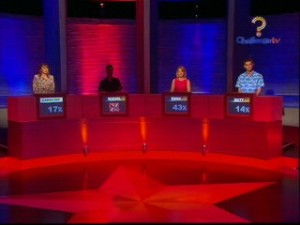 One player gets wallied for the next question (we're also shocked to find "wallied" isn't in our computer's dictionary)
One player gets wallied for the next question (we're also shocked to find "wallied" isn't in our computer's dictionary)After a given time limit (which always seems to end just as a question's finished - hmmm, funny that) the player with the lowest score is eliminated and is asked to leave in a poor The Weakest Link-style imitation.
At various points in the show, host Richard Orford asks the cameras to find the defector in the audience who is leading in their own competition. An unintentional comedy moment happens here because the background music is quite low and you can quite clearly hear that the studio has the squeakiest studio seats known to Man. Anyway, the leading defector is identified and their reaction ranges from nonchalance to utter amazement.
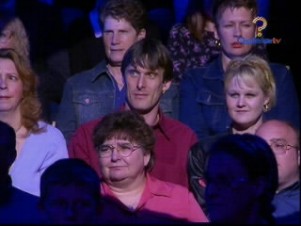 "He's with his mistress, he's currently on the run from the police, it's Steve Watkins from Dorchester!"
"He's with his mistress, he's currently on the run from the police, it's Steve Watkins from Dorchester!"After the break, the same pattern of rounds pretty much happens with the remaining three players. This leaves us with two finalists.
Now, this is the only place where there are real cracks in the show's format. There is a rule in game show development called "don't give the player in front the extra advantage" (our title). What this basically means is to avoid situations where the leading player goes even further in the lead. For the basis of a good competition you'd really want a mechanism that gives the player in last place an opportunity to catch up but not at any cost otherwise it would look unfair.
The problem with Defectors is that over time the audience would be mad not to vote with the player that was leading up to this point unless there was a specific topic that they felt (s)he was weak on.
This may explain why the scores of the two remaining contestants are completely wiped out before the final round, which smacks of unfairness but it's usually necessary because the winner can be hundreds of points further ahead than his second place contestant at this point. In fact, it's often not so much a race to win the game but just to avoid being in last position when the eliminations occur.
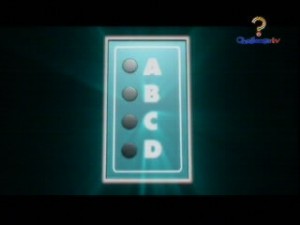 A defector's voting panel
A defector's voting panelHowever, even though the scores may be wiped out, the memories of the defectors aren't erased so easily. In the final round, we're back on the multiple choice questions but this time you have to get the right answer AND receive over 50% of the audience vote in order to score. Usually this goes with the run of previous form, with some games ending 350 to 0, and it's a bit of a low point in an otherwise reasonable game.
At the end of the show, the winning player and defector both come to the front of stage to receive their wad of £1000 of stage money ("Is it real? Oh, not it's not" said one disappointed but highly entertaining contestant).
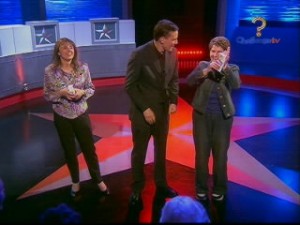 Richard gives the contestants their dues
Richard gives the contestants their duesHost Richard Orford - he of former Big Breakfast roving reporter fame - is a really great emcee, chipping in with useful and timely incidental information in order to help sway the (usually stubborn) audience, particularly if the winner in points terms has actually answered fewer questions than one of the other players. It's also clear that he knows what he's talking about when reading the questions and he's got a good sense of control.
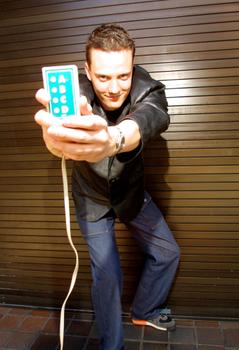 Host, Richard Orford
Host, Richard OrfordThe lighting is rather good for this type of show, with the backgrounds of each player lighting up when their buzzer is pressed. Even the set is fairly nice, although it's a shame they don't seem to make more use out of the giant projector screen that seems to just sit there and display the Defectors logo throughout the programme.
With quite a number of elements that are top class, it's a pity that there are a couple of flies in the format ointment. We've already mentioned the rather poorly-conceived end game. However, the one that's getting our goat the most is the clangy geee-tarrr music. Now, you might think this is rather petty, but give us a chance to explain.
It's not that there's much wrong with the music, even if it does slightly suffer from the "cheap synth" syndrome we've seen so often before. It's the fact that some form of jingle is played during the 40 minute programme FIFTY-ONE times (yes, we're so sad we actually counted). In other words, that's one jingle every 40 seconds of programme time. Surely someone would have noticed that this would irritate with all the ferocity of a barbed wire jockstrap?
However, when you look back to its woeful efforts in the Family Channel days, you have to say that Defectors is a qualified success for the new grown-up Challenge TV. The show's got an original format, an excellent host, good if not perfect production values and quite an entertaining 40 minutes all said and done.
Hopefully, with a few more tweaks in future series, this will turn out to be a very welcome elephant to the game show zoo.
Catchphrases
"The audience have defected against you, it's time to leave"
Inventor
Format by Mast Media

